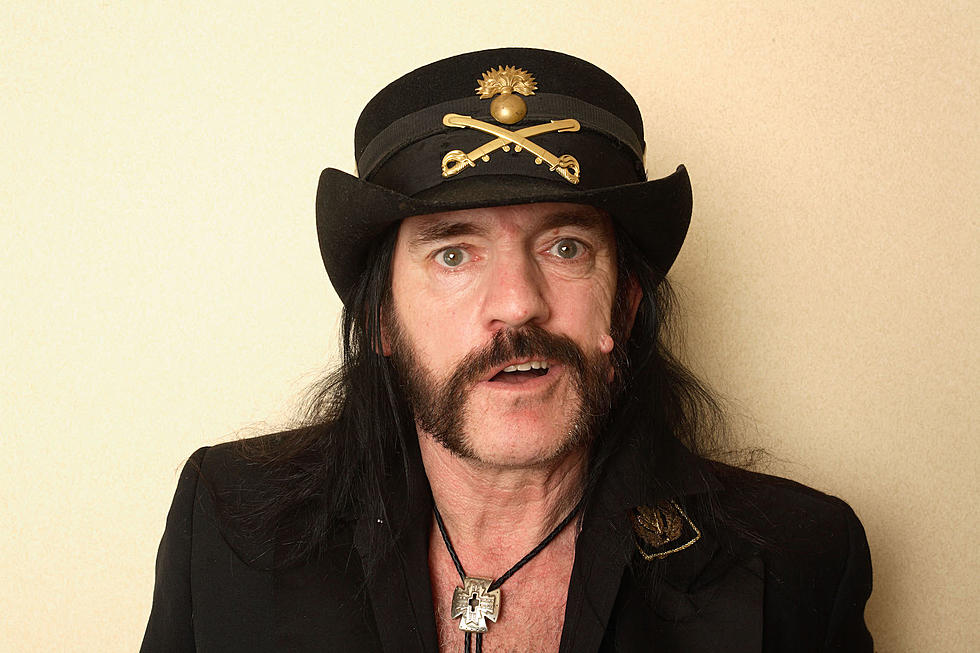
Seven Years Ago – Motorhead Pioneer Lemmy Kilmister Dies
The last two years of his life, Motorhead frontman Lemmy Kilmister was plagued with health problems. Still, the rock and roll legend, who seemingly spent half his career with a tall glass of Jack Daniels lightly flavored with Coca-Cola in his hand, appeared to be indestructible. And up to the very end he strived to live up to the role, performing a series of eardrum-bursting concerts in Europe during the final month of his life, not knowing his body was riddled with an aggressive form of cancer. And even though he felt like s--t the entire time, he still planned to return to Europe in January to continue touring.
But just two weeks after attending a star-studded party at the Whisky a Go Go in Los Angeles to celebrate his upcoming 70th birthday — which took place Dec. 24 — Kilmister succumbed to his illness and died on Dec. 28, 2015.
Kilmister lived to rock and rocked to live. He was the living, breathing embodiment of heavy metal, though he refused to embrace the term, claiming he was just performing an amped up version of rock 'n' roll in the tradition of his heroes -- Little Richard, Chuck Berry and The Beatles. It's amazing that Kilmister was able to summon the strength throughout 2015 to play shows and even record a full, final album, Bad Magic, which came out Aug. 28, 2015, exactly four months before he died. The guy was a natural songwriter and performer and his courage was practically unparalleled. He even wrote and recorded the predecessor to Bad Magic, 2013's Aftershock, when he was suffering from a serious heart condition and diabetes.
The title was a black humor reference to his heart arrhythmia, for which he underwent surgery in 2013 and received a mini-defibrillator that sent a jolt of electricity to his heart when it detected an irregular beat. Lemmy canceled a few Motorhead performances when absolutely necessary, but persevered with most, even when he needed a cane to get from the backstage area to the stage.
After his health scares, doctors ordered Lemmy to modify his lifestyle and he complied... to an extent. He stopped smoking and substituted his cravings by eating blueberries by the carton, which caused his body to retain fluids and Lemmy to gain weight. At first, doctors were mystified, but when they discovered the cause of the weight gain Lemmy dropped the berries and returned to cigarettes – albeit only a pack a week – down from two packs a day.
He also switched from a 40-year habit of a half-gallon of Jack Daniels daily to four to five glasses of vodka and orange juice a day. Two days after the giant 70th birthday party in his honor at the legendary Whisky a Go Go — which was attended by Slash, Billy Idol, Sebastian Bach, Lars Ulrich, Zakk Wylde and countless other celebrities – Lemmy suffered chest pains and was treated at the hospital, but doctors discovered nothing wrong.
Concerned by Lemmy's faltering speech, his longtime manager Todd Singerman asked doctors to perform a brain scan. Lemmy's management was concerned that he might have suffered a stroke. Considering all the blood tests and other medical procedures Kilmister had undergone, the results of the CatScan were shocking. Lemmy had cancerous tumors throughout his brain and neck. Doctors determined the condition was untreatable and predicted he had two-to-six months to live.
Motorhead's management prepared to issue a simple statement announcing that Lemmy was seriously ill and was unable to tour. But the rocker asked his handlers to put out a truthful press release, indicating that he was suffering from an aggressive form of cancer. Reportedly, Lemmy took the news in stride. He had cheated death so many times in the past and had lived such a hard, fast life he didn't expect to stay around for long.
The owner of Lemmy's favorite establishment, The Rainbow Bar & Grill, brought a video slot machine game to Kilmister's condo and nurses were hired to take shifts and administer morphine as Lemmy's pain became worse.
Singerman and others began calling friends and family. Lemmy told his bandmates in Motorhead and everyone planned to visit right away. Ozzy Osbourne reportedly scheduled to drop by on the 29th or 30th.
On Dec. 28 Rainbow owner Mikael Maglieri came by while Lemmy played his video game for hours. Then Kilmister fell asleep and died. In the days that followed, the music community grieved the loss of one of rock 'n' roll's most iconic figures.
“Lost one of my best friends, Lemmy, today,” tweeted Osbourne. “He will be sadly missed. He was a warrior and a legend. I will see you on the other side.”
“Lemmy: Rest in peace,” tweeted Gene Simmons. “Shake the heavens, my friend.”
Perhaps Anthrax guitarist Scott Ian made the statement Lemmy would have agreed with most. “He lived a life of dreams and he went out on top. He was Motorhead and HE PLAYED ROCK & ROLL!!!”
Loudwire contributor Jon Wiederhorn is the author of Raising Hell: Backstage Tales From the Lives of Metal Legends, co-author of Louder Than Hell: The Definitive Oral History of Metal, as well as the co-author of Scott Ian’s autobiography, I’m the Man: The Story of That Guy From Anthrax, and Al Jourgensen’s autobiography, Ministry: The Lost Gospels According to Al Jourgensen and the Agnostic Front book My Riot! Grit, Guts and Glory.
See Where Lemmy Kilmister Ranks Among the Top 66 Hard Rock + Metal Bassists of All Time
More From WPDH-WPDA










